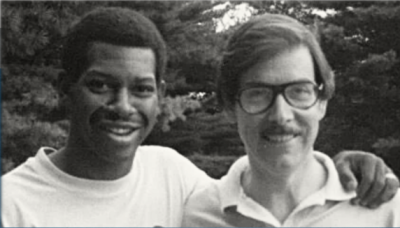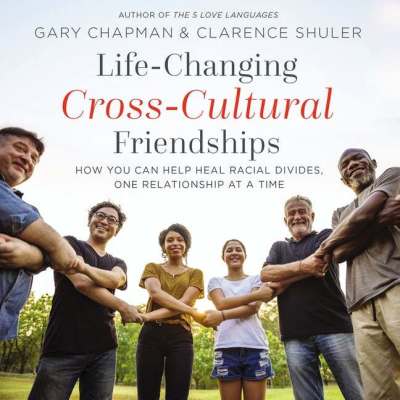'5 Love Languages' author, lifelong friend share how cross-cultural friendship breaks racial divides

Clarence Shuler vividly remembers the day he met Gary Chapman.
It was the late 1960s in Winston-Salem, North Carolina, a town rife with racial unrest and Klan activity, when Shuler was invited to play basketball at a church gym. The problem was, the church was a white church — and Shuler’s parents, concerned about his safety, did not want him to go.
But Shuler begged and eventually, his parents relented. While Shuler was on the basketball court — where he was just one of two black kids — a white youth pastor came up to him, shook his hand and introduced himself.
“Gary came over and introduced himself and was really friendly, and I felt safe with him; I felt I was going to be OK,” Shuler recalled in an interview with The Christian Post.
“When Gary came on the basketball court to greet me, he made me feel comfortable. He was very intentional about that. He came up to me, introduced himself, said who he was and shook my hand, a couple of things that were really important to me, and maybe he sensed that.”
That simple introduction sparked what has been a decadeslong friendship between the two men. And it was at a church retreat several years later that Chapman preached a sermon where Shuler dedicated his life to Christ.
“Clarence and I didn't set out to say, ‘Let’s build a lifelong friendship,” Chapman said. “We started out by treating each other with dignity and respect and treating them like they were a friend. And eventually, we became friends.”
After many years of friendship, Chapman, author of the bestselling book, The Five Love Languages, and Shuler, a counselor, speaker and author, know a thing or two about cross-cultural friendships. Now, they’re sharing what they’ve learned over the years in their forthcoming book,Life Changing Cross-Cultural Friendships: How You Can Help Heal Racial Divides One Relationship at a Time.
The two men, who also co-authored the 2019 book Choose Greatness: 11 Wise Decisions That Brave Young Men Make, said they were compelled to write the book after witnessing the racial unrest that has reared its head in recent years.
“We’re almost back to where we were all those years ago,” Chapman said. “I know we're not exactly; a lot of things have changed for the better. But there's also a lot of animosity there and distrust and that sort of thing.”
The duo wrote the book primarily for a Christian audience, a demographic Chapman said has felt, over the last few years, helpless and discouraged in the face of racial tension. Breaking down racial barriers, he said, begins with simply stepping out of one’s comfort zone and initiating a conversation.
“Here’s something one person can do: They can pursue trying to initiate a conversation, and then later a friendship if it develops into that, where you can really get to know a person of another race or culture, learn from each other and let the other person explain to you what's going on in their culture and in their mind, and do the same with you. If enough people did that, it would make a change in the country.”

Shuler noted that Jesus Himself is the ultimate example of how to engage in cross-cultural relationships. Reaching out to someone from another culture can be “risky,” he said, as there’s always the possibility of getting rejected or misunderstood.
“But of like Jesus with the Samaritan woman, He had staying power. So when she initially rejected Him, He kind of hung around and kept talking, asking her questions, and eventually connected with her and she connected with Him,” he said.
Christians, Chapman agreed, must be evangelism and discipleship-minded when engaging with others.
“I think if Christians can get the picture that, we're all God's children if we've accepted Christ, we're going to spend eternity in Heaven,” Chapman stressed. “So let's get to know people, Christians and non-Christians, because sometimes beginning a friendship and conversation with someone who is not a Christian, If they see that you're respecting them and interested in them, they may be interested in your God.”
“As Christians, we're always thinking of evangelism and discipleship, with whoever we encounter. But that doesn't mean if they don't accept Christ, were to have nothing to do with them. No, no. We're going to stick with them as long as they stick with us.”
The importance of language
In their book, Chapman and Shuler discuss the importance of words, showing empathy and listening when it comes to building a friendship with someone from another culture. And they're candid about their own missteps: The two shared how, shortly after they met, Chapman used the word “boy” to refer to Shuler and his friend, James, unaware of how offensive the term was to them.
“I drove up in front of Clarence’s house, and he and James, his friend, were sitting on the porch,” Chapman recalled. “And I got out of my car and I was walking down the sidewalk toward the house. And I said, ‘You boys ready to go?’ And his friend James said, ‘I ain't no boy.’ And I stopped, and I said, ‘OK, James, I think we need to talk.’”
Shuler recalled how Chapman sat with him and James, seeking to understand why his words were so offensive: “In our culture, the rule was, don’t let any white person call you boy, even if you're a boy, because it's demeaning,” he said. “Gary didn’t know or understand that.”
“So we sat down, he shared his perspective, which we understood, and then we shared ours, and then and he never called us boy again, even though after that, he could have and we would have understood,” he continued.
People are often well-meaning when they use the wrong terms, such as “color-blind,” Shuler, who provides secular and nonsecular diversity training to organizations, said.
“For people of color … when people talk about, ‘We're all the same, [I’m] colorblind, we tend to interpret it as you don't see me, or you don't value me, which is not what they really intend, but it comes across that way,” he said.
“And a question is, if you're colorblind, then are we all the same? And we really aren't. … I think we need to learn to celebrate differences because God does in 1 Corinthians 12 when He talks about spiritual gifts. Differences are really a plus to the body. But with those differences, if you're going to have biblical unity, you also have interdependency; I need Gary, he needs me we learn from each other.”
Having the attitude of Christ
The word “love” is also one of the most misunderstood words in the English language, Chapman said, stressing that for Christians, love does not begin with a feeling but with an attitude.
“It’s the attitude that Christ had when He left Heaven, came to Earth, got on level ground with us, and then humbled Himself to death on a cross,” he said. “He said, ‘You love others like I love you.’ And He loved us when we unlovely. We weren't seeking Him; He reached out to seek us. So love in the Bible is an attitude that, I want to enrich the lives of the people who I encounter on a regular basis in my life.’”
“Falling in love begins with a feeling, but not this kind of love,” Chapman added. “It begins with an attitude and then appropriate behavior. And yes, there will be emotions there to be sure, but it doesn't start with an emotion.”
Chapman defined friendship as “an attitude and a commitment to the well-being of the other person,” adding: “We can disagree on a whole lot of things and still have a friendship, where we're sharing life with each other and doing everything we can to help each other become what we believe and they believe God wants them to become.”
Though there has been an increasing push for multicultural churches in some Evangelical circles, Shuler stressed that that’s not necessarily the answer when it comes to breaking cultural barriers and building friendships.
“I think what's most important is that we're in a church where we get fed, and then how we live our life outside in the rest of the world will impact the color our church,” he said.
Chapman agreed, “You can be in a church that has multiple cultures in it, but still not have friendships. They meet for an hour or two hours of worship, and it's wonderful, but they're not in each other's homes and they're not doing things together. …I’m all for multicultural churches, but … we need to break beyond. We need to think in terms of relationships, individual relationships.”
Through their book, Shuler and Chapman hope readers will, with God’s help and direction, seek out cross-cultural friendships — and that their worldview will change.
“We really believe that that will help improve race relations in America,” Shuler said. “Part of frustration we have is that typically, one group of people didn't understand another group of people. But once we start building relationships … a lot of times when we understand that alleviates frustration. … when we understand, that can often lead us to agreement.”
Shuler contended that it’s easy to dehumanize others when there is no relationship — but when there is a relationship, and we fully understand that others are created valuable and created in the image of God, it’s possible to move forward.
“I would love to see a million people who don't have cross-cultural friendships develop cross-cultural friendships, and [that would] improve the quality of life in America and decrease some of the racial tension,” he said.
It’s possible for anyone to reach out and begin the process of building a friendship with someone of a different background, Chapman added.
“That's our hope, is that that will begin to happen, individual by individual, one relationship at a time, and when … a larger number of people develop an understanding, it's going to change the climate of the culture.”
Leah M. Klett is a reporter for The Christian Post. She can be reached at: leah.klett@christianpost.com





























